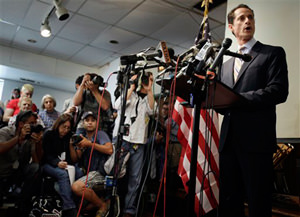Nation of Weiners
There is a culture gap in this country, between people who are happy to enjoy what's left of their privacy and people who just don't think about it. It is outrageous that Weiner's Twitter foul cost him his job when we take rampant corruption in Washington for granted.
I pretty much lost it while watching David Gergen, a veteran of the Nixon White House, trying to make sense of sexting. The CNN analyst surely witnessed his share of villainy in that administration and the three others he served in, and he probably has no problem comprehending something like the illegal bombing of Cambodia or welfare reform. But who sends pictures of his penis to strangers?
A lot of people, as it turns out. There is a culture gap in this country, between people who are happy to enjoy what’s left of their privacy and people who just don’t think about it. It’s not that No. 1 NBA draft pick Greg Oden wanted to expose his penis to fans — it just never occurred to him that anybody but his lady friend would get a peek. There are a number of professional athletes — and at least one politician — for whom the previous sentence would work.
There is a generation of Americans that has grown up in a surveillance state, people who have adapted to constant monitoring by going even further and exposing themselves and the minutiae of their personal lives. Of course there’s a difference between broadcasting your reaction to the last episode of “Game of Thrones” and sending someone a testicle close-up, but both seem to inspire the same kind of incredulity in those who can’t imagine the impulse to do either.
This of course doesn’t explain Anthony Weiner, who has his own issues, and it is not meant to excuse his being a shitty husband or a lame older guy on the prowl for young women. It does, however, shed light on the rhetorical acrobatics of one news pundit after another struggling to decipher the moral implications of a “crime” — sexting and its social media equivalent — that for younger viewers has potential to embarrass but is considered common. As one college student recently explained to me, as if I were a cave man unfrozen from a time when word got around on smoke signals, it means “sexy texting.”
The mainstream news media, appealing to their imagined constituency, have given voice to an American puritanism that isn’t always sure of the difference between horniness and criminal depravity. I was at a bar in New York City not far from then-Rep. Weiner’s congressional district when someone compared him to Eliot Spitzer, the former New York governor and state attorney general who got caught paying for sex and as a result was condemned to host a babble show on CNN. “But what Spitzer did was illegal,” I offered, not that it matters.
On “Left, Right & Center,” a news panel program on KCRW FM, Thomson Reuters Digital editor Chrystia Freeland was asked to speak on behalf of women but couldn’t muster the indignation of her male colleagues on the show: “Is this worse than going to watch a stripper?” she asked. “Is this worse than calling someone up on those phone sex lines? I don’t see that the conduct was actually that dreadful.”
What if Weiner had gone to a strip club? Would he have been forced to resign, as he did Thursday? I don’t think so. Weiner did not garner national ignominy by looking at an exposed stripper; he exposed himself, and was thus deemed a pervert. Can the same be said of the Cleveland Indians’ Grady Sizemore, who has been allowed to continue to play baseball after exposing himself?
Judging by his recent column on Weiner, E.J. Dionne would have something to say about sports references of this kind: “Perhaps it is old-fashioned, but I have been suspicious of politicians tweeting from the moment it became vogue. Do we really need to encourage them to limit their thoughts to 140 characters or make them think we want the same details about their lives that we expect from pop stars and marquee athletes?”
This is a recurring theme among the commentariat, the implication that Weiner was foolish for messing around with this strange Twitter thing in the first place. That’s nonsense. Why should I have less access to the thoughts of my representatives in Congress than I do to those of Snoop Dogg? Would Dionne rather every word pass through a speechwriter? Weiner got in trouble precisely because, unlike many of his colleagues, he insisted on doing the tweeting himself (after all, it would be unseemly to ask an aide to take and then send out pictures of your crotch). It’s a shame some others in public office will now be put off from using Twitter, or will post only carefully parsed talking points.
A campaign operative once told me that in 20 years or so we’ll be less fixated on a candidate’s private life. Everyone will have embarrassing photos, comments and videos on Facebook and elsewhere. Bill Clinton caught hell for admitting coming within sniffing distance of a joint, while George W. Bush and Barack Obama got elected despite alleged and admitted cocaine use. Eventually politics catch up to the culture, or at least that’s the idea.
I doubt that many voters’ porn searches would stand up to the scrutiny currently applied to Weiner. That said, I certainly don’t mean to endorse his behavior. He appears to be, at best, a cyber slut and at worst a sexual harasser. However, it is outrageous that Weiner’s Twitter foul cost him his job when we take rampant corruption in Washington for granted.
Take Meredith Attwell Baker, who, as an FCC commissioner, voted to approve the merger of Comcast and NBC. About four months later she would go to work for the new company, as a lobbyist, no less. Why isn’t the name Meredith Attwell Baker synonymous with corruption? Why hasn’t the public demanded her resignation from the corporation? Why hasn’t Congress held hearings on the suspect operation at the Federal Communications Commission?
Had Baker sent a Twitter follower a boob shot, she would be notorious.
I suppose it’s asking a lot of the same Congress that keeps us in multiple pointless wars and puts our children into debt on behalf of Citigroup to get its priorities straight, and it’s too much to ask America’s cable news networks to stop living for this kind of garbage. But can’t we at least expect more of ourselves?
Your support matters…Independent journalism is under threat and overshadowed by heavily funded mainstream media.
You can help level the playing field. Become a member.
Your tax-deductible contribution keeps us digging beneath the headlines to give you thought-provoking, investigative reporting and analysis that unearths what's really happening- without compromise.
Give today to support our courageous, independent journalists.



You need to be a supporter to comment.
There are currently no responses to this article.
Be the first to respond.